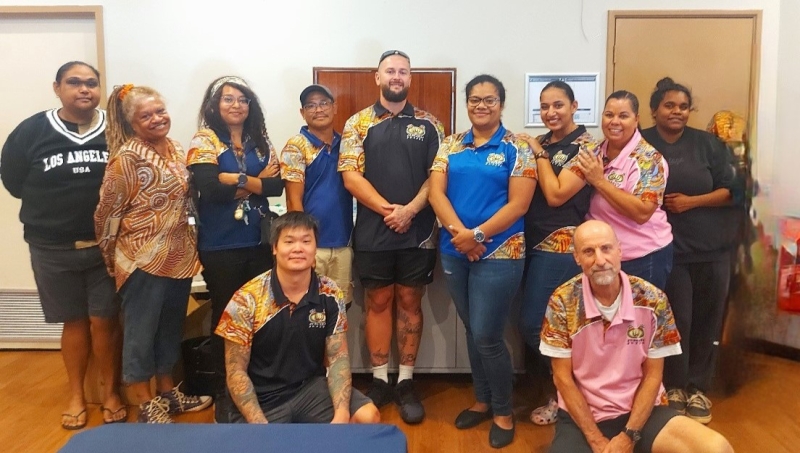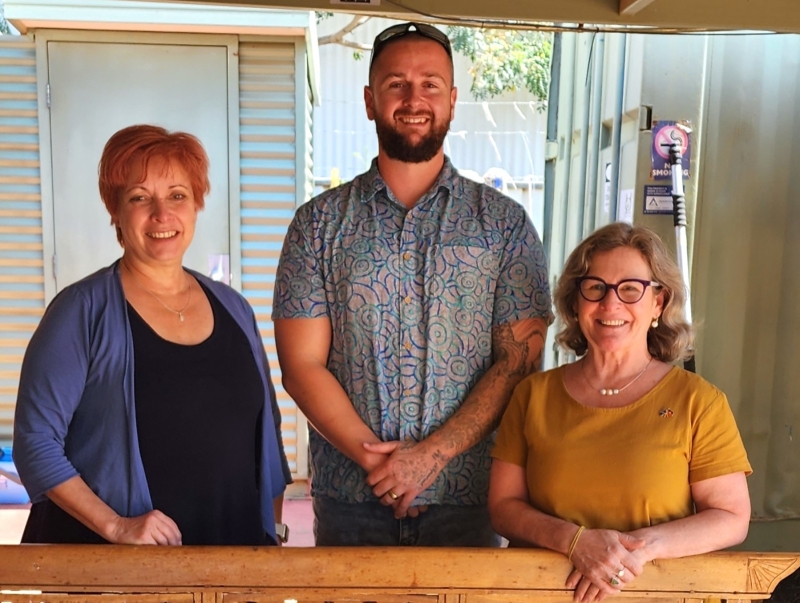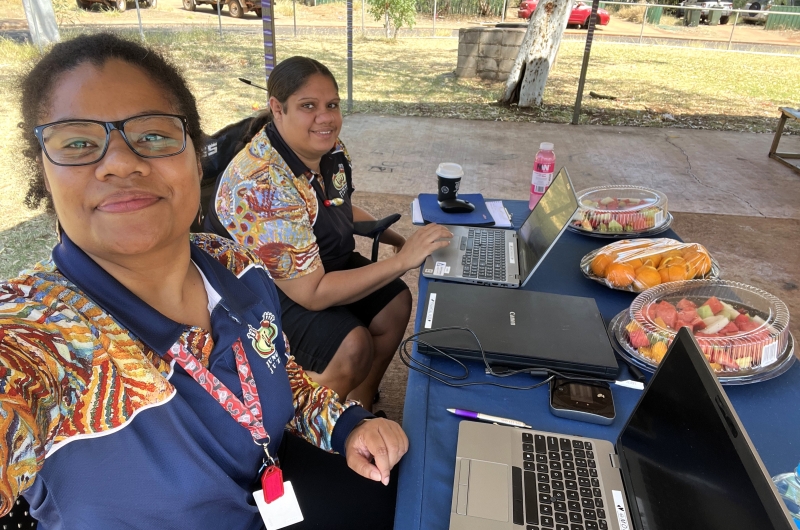An ever-evolving role in remote community wellbeing
Since 1989, Jungarni-Jutiya Indigenous Corporation has supported the safety and wellbeing of families who live in remote parts of northeast WA. The name ‘Jungarni-Jutiya’ means ‘straight path’ in Jaru language – Jaru and Kija peoples are the Traditional Owners of the surrounding lands.

Called Jungarni for short, the team of 17 provides services to residents of the shire of Halls Creek, which covers 143,030 km2 of the Kimberley between Kununurra and Fitzroy Crossing. During wet season, which goes for around 3 to 4 months, the town is cut off by flooding and movement is restricted.
Being able to access essential services online, like banking and mygov, helps people living in communities like Halls Creek stay connected. But it’s also thrown some new challenges into the mix, which Jungarni is cleverly responding to.
A hub for local employment
Jungarni’s CEO is Koori man Matt Harbisher. He has been with the organisation for 6 months. After moving from the Northern Rivers region in NSW, he’s adjusting to the flexibility and unique challenges of a corporation servicing remote communities.

Left to Right: Key Assets Australia CEO Dianne Jackson, Jungarni Jutiya CEO Matt Harbisher, Key Assets Australia State Director Brenda Yelland.
‘Our staff are mostly local Aboriginal people. We bring in staff from other communities and specialists for a mix of rare positions. But we try to hire local people,’ says Matt.
‘Most are full-time or part-time, with casuals doing Community Connect (formerly Night Patrol) – which is a team who drives a bus to help elderly people who go to the shop have a lift home with groceries, transport to and from hospital or transport at night for kids. No taxis or Ubers in Halls Creek!’
The 7 directors are mainly local people who also work at other organisations in town.
‘A lot of our local staff and community travel a lot between the outer communities. Halls Creek is a main hub, but a lot of our people have connections to the outer community. Things move slowly but the connections are important. It’s a laid-back community and you have to be flexible,’ says Matt.
‘We have a really good team. We encourage teamwork and shared decision-making. Aunty Sue is the service manager doing the day-to-day stuff. We’re really supportive of shared leadership – even people in entry level.
‘We acknowledge that every worker within our organisation comes with their own unique professional knowledge and life experiences that we rely upon to make informed decisions with the clients and community we work with.
‘We are passionate about creating leadership and management pathways for the local staff who will be here in town long term, giving them a sense of empowerment and value in our agency.’
Helping a remote community stay safe online
This busy team at Jungarni has become relied on for a variety of online services focused on safety. Being able to access banking online has meant people living in and around Halls Creek can do their banking more easily, however the quickly changing technology has brought new challenges; scammers are particularly dangerous.
‘Any remote community is a hotspot for scammers. We’ve had some in town where organisations were scammed from people pretending to be Microsoft. English might be a second or third language for community members and we make sure if they’re uncertain they know to come to us,’ Matt says.
As a result of their Digital Literacy Program, computer and internet access and expert assistants with finance, Jungarni is seeing ‘a line around the corner every day’.

Financial Capability Workers Lucy Navoka and Roseanna Long.
‘Our Digital Literacy Program is supported by our financial counsellor, who does one-on-one appointments with clients, and capability workers who help with anything to do with money and banking. It’s about increasing community awareness around digital literacy, like having safe passwords or accessing mygov,’ explains Matt.
‘Birth certificates are also a big challenge. Some people don’t have births registered and they’re in their sixties and seventies so are unable to set up mygov to access Centrelink or open bank accounts.
‘Our staff might spend an hour to an hour and a half on the phone to ANZ to advocate for our people and we try to reiterate that we’re nowhere near a bank. Commonwealth Bank is 4 hours away.
‘Some community members, Elders in particular, struggle with transferring money from one account to another.’
Retention is key when recruitment is tough

Jungarni staff on the road.
Matt’s career has been in Aboriginal out-of-home care, which he has worked in across different states. Jungarni has some child protection programs, but Matt says, ‘there’s room for growth. NSW is well set up in the child protection space whereas there are only a few Aboriginal community controlled organisations delivering it in WA.’
Matt’s bringing expertise from other states on this issue to WA and introduced a program called ‘Home Stretch’ to work with children who are 17 and transitioning out of care into adulthood.
With demand on the organisation growing, and more opportunities available to expand, Matt has his sights set on recruitment and retention of staff. However, the challenges are many in this area, with a lack of housing and overcrowding of staff properties among them.
‘My wife, 5 kids and I moved over from the east coast. It’s been great to be a part of the community,’ reflects Matt.
‘When we first got here there were a number of vacancies. We got people on the ground. We’re working together in intense and complex roles and we put responsibility back onto workers to make sure our staff feel valued for their opinions.
‘We’re working with the Board to put in place some attractive packages and employee incentives so we can be an employer of choice. We want to offer good packages to retain staff.’
Jungarni is an organisation that’s always looking ahead so it can continue helping community with welfare, life skills and education programs in the face of remote location challenges and new concerns.